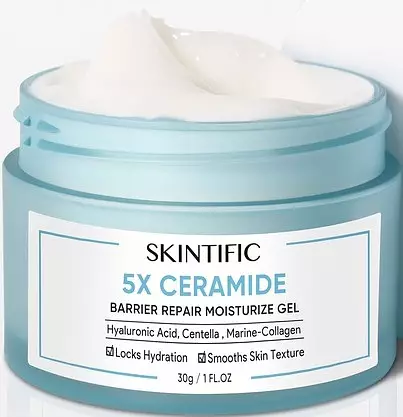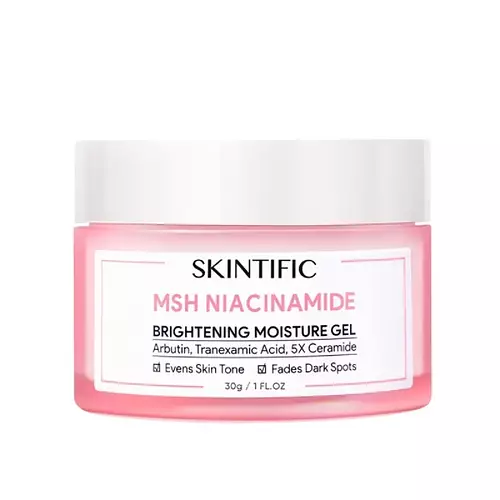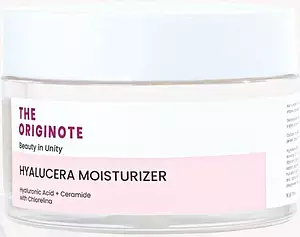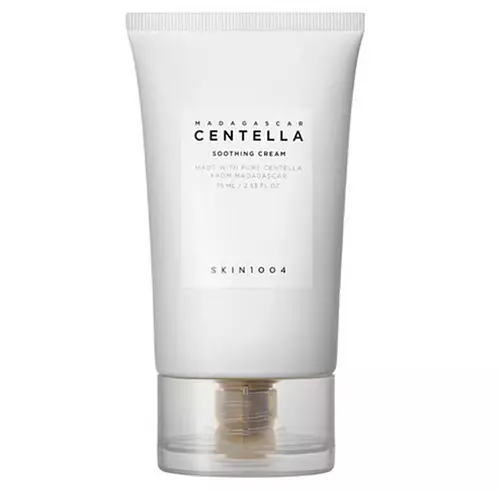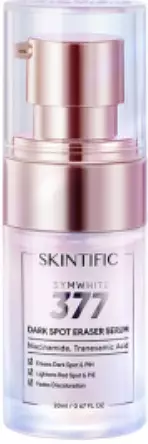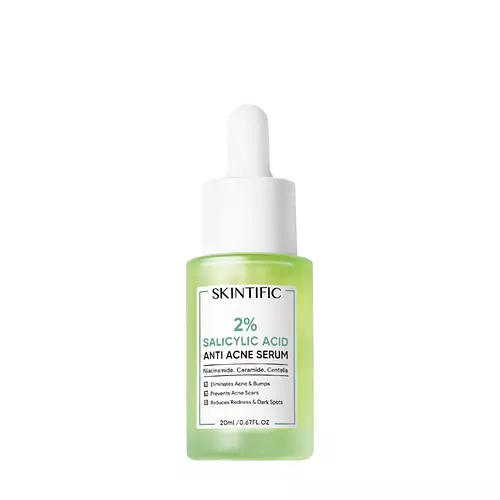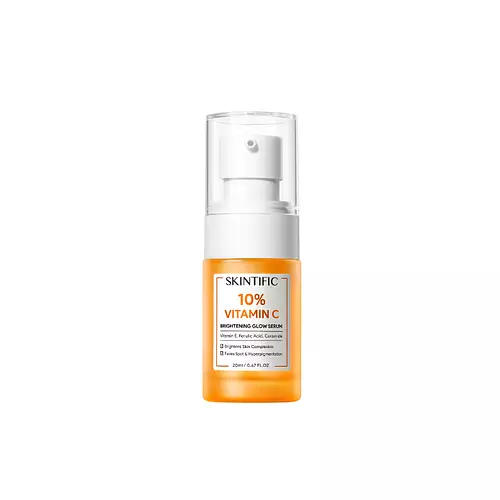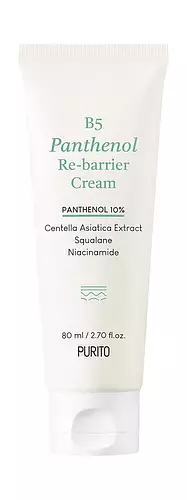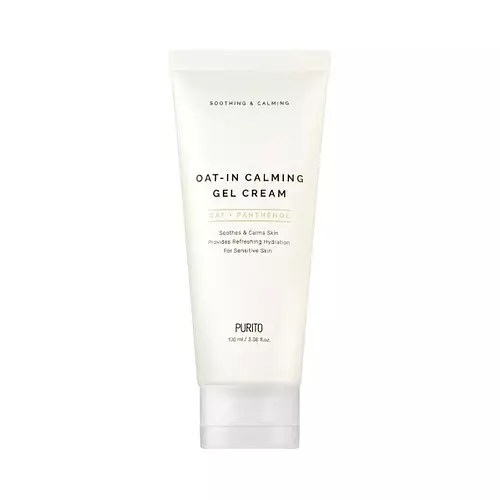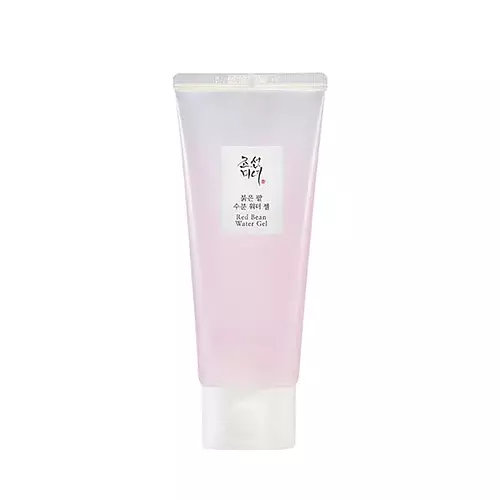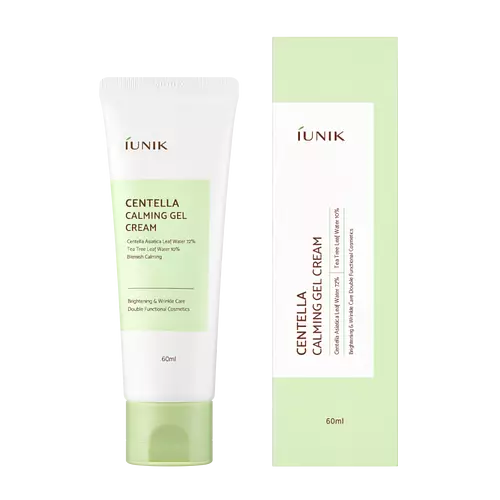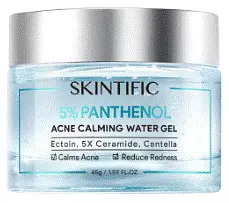
Skintific 5% Panthenol Acne Calming Water Gel Ingredients Explained
Overview
What it is
General moisturizer with 35 ingredients that contains AHA, ceramides, exfoliants, Vitamin C and Vitamin E
Cool Features
It is cruelty-free and reef safe
Suited For
It has ingredients that are good for anti aging, dry skin, brightening skin, sensitive skin and scar healing
Free From
It doesn't contain any harsh alcohols, common allergens, fragrances, oils, parabens, silicones or sulfates
Fun facts
Skintific is from Malaysia. This product is used in 48 routines created by our community.
We independently verify ingredients and our claims are backed by peer-reviewed research. Does this product need an update? Let us know.
General moisturizer with 35 ingredients that contains AHA, ceramides, exfoliants, Vitamin C and Vitamin E
Quick info
You should know
Notable Ingredients
This product contains 1 ingredient that may have this attribute:
This product contains 2 ingredients that may have this attribute:
This product contains 1 ingredient that may have this attribute:
This product contains 1 ingredient that may have this attribute:
This product contains 5 ingredients that may have this attribute:
Benefits
This product contains 8 ingredients that may have this attribute:
This product contains 6 ingredients that may have this attribute:
This product contains 7 ingredients that may have this attribute:
This product contains 6 ingredients that may have this attribute:
This product contains 1 ingredient that may have this attribute:
This product contains 4 ingredients that may have this attribute:
Concerns
This product contains 1 ingredient that may have this attribute:
This product contains 1 ingredient that may have this attribute:
Ingredients 35
Water. It's the most common cosmetic ingredient of all. You'll usually see it at the top of ingredient lists, meaning that it makes up the largest part of the product.
Panthenol (also referred to as pro-vitamin B5) is a common ingredient that helps hydrate and soothe the skin.
Methyl Gluceth-20 is a humectant. Humectants help draw moisture from the air to your skin.
Dipropylene Glycol is a synthetically created stabilizer and solvent. It is a part of the glycol class in the alcohol family.
Centella Asiatica Extract (Cica) is derived from an herb native to Southeast Asia. It is famous for its anti-inflammatory and soothing properties.
Avena Sativa Kernel Extract is is derived from colloidal oatmeal. Besides being a healthy breakfast, oats have many benefits in skincare too.
Chlorella Vulgaris Extract comes from the microalga, Chlorella vulgaris. It is hydrating and contains antioxidants. Studies also show Chlorella Vulgaris may help in rebuilding collagen and elastin.
Pentylene glycol is typically used within a product to thicken it. It also adds a smooth, soft, and moisturizing feel to the product. It is naturally found in plants such as sugar beets.
Acrylates/C10-30 Alkyl Acrylate Crosspolymer is a synthetic polymer. It is used to thicken and improve the texture of products.
Tromethamine is an aliphatic compound. An aliphatic compound is an organic compound with open-chained carbon atoms. It is synthetically created. Tromethamine is used to balance pH and improve texture.
1,2-Hexanediol is a multi-tasker ingredient. It acts as a preservative to increase shelf-life and can aid other preservatives in preventing microbe growth. 1,2-Hexanediol also helps the skin retain moisture as a humectant.
Ectoin is a compound found naturally in some species of bacteria. It can be synthetically created for skincare use.
Ceramide NS is a type of Ceramide. Ceramides are intercellular lipids naturally found in our skin that bonds dead skin cells together to create a barrier. They are known for their ability to hold water and thus are a great ingredient for dry skin.
Butylene Glycol (or BG) is used within cosmetic products for a few different reasons:
Glycerin is already naturally found in your skin. It helps moisturize and protect your skin.
Ammonium Acryloyldimethyltaurate/Vp Copolymer (let's call it AAVC for short) is a synthetically created polymer. It's used as a film-forming agent and used to thicken the consistency of products.
Hydrogenated Lecithin is created from the hydrogenation of lecithin. Hydrogenation is a chemical reaction between molecule hydrogen and another element.
Tocopherol (also known as Vitamin E) is a common antioxidant used to help protect the skin from free-radicals and strengthen the skin barrier. It's also fat soluble - this means our skin is great at absorbing it.
You might know this ingredient as a sugar substitute in foods. It is a sugar alcohol with humectant properties.
Propanediol helps absorb ingredients into your skin, boosting their benefits. It can act as an emollient, making your skin softer. Propanediol can help products last longer by boosting the properties of preservatives within the formulation.
Phytic Acid is a gentle AHA and antioxidant. The chemical makeup makes it classified as an AHA, such as lactic acid.
Lecithin is a term for a group of substances found in plants, animals, and humans. They are made up of mixture of fatty acids. These fatty acids usually are a mixture of phosphoric acid's choline ester connected to stearic, oleic, and palmitic acids. Most lecithins are created from plant ingredients scuh as sunflower.
Sodium Ascorbate is a form of Vitamin C. It is derived from the sodium salt of ascorbic acid.
Ascorbyl Palmitate is created by combining pure Vitamin C and palmitic acid. It is an antioxidant and helps reduce hyperpigmentation.
Water, Panthenol, Methyl Gluceth-20, Dipropylene Glycol, Centella Asiatica Extract, Calendula Officinalis Extract, Avena Sativa Kernel Extract, Phaeodactylum Tricornutum Extract, Chlorella Vulgaris Extract, Pentylene Glycol, Acrylates/C10-30 Alkyl Acrylate Crosspolymer, Tromethamine, 1,2-Hexanediol, Ectoin, Ceramide NP, Ceramide As, Ceramide Ns, Ceramide AP, Ceramide EOP, Butylene Glycol, Glycerophosphoinositol Choline, Glycerin, Ammonium Acryloyldimethyltaurate/Vp Copolymer, Hydrogenated Lecithin, Tocopherol, Pentasodium Pentetate, Erythritol, Propanediol, Phytic Acid, Silver Oxide, Diethoxyethyl Succinate, Hydroxyphenyl Propamidobenzoic Acid, Lecithin, Sodium Ascorbate, Ascorbyl Palmitate
Ingredient Ratings
Based on the number of likes and dislikes each ingredient has received.
Ingredients Explained
Water. It's the most common cosmetic ingredient of all. You'll usually see it at the top of ingredient lists, meaning that it makes up the largest part of the product.
So why is it so popular? Water most often acts as a solvent - this means that it helps dissolve other ingredients into the formulation.
You'll also recognize water as that liquid we all need to stay alive. Talk about multi-purpose! If you see this, drink a glass of water. Stay hydrated!
Learn more about WaterPanthenol (also referred to as pro-vitamin B5) is a common ingredient that helps hydrate and soothe the skin.
lt is a humectant, meaning that it helps the skin attract and retain moisture.
Another benefit is the anti-inflammatory abilities. This means that it's great for sensitive, irritation-prone skin.
Once oxidized, panthenol converts to pantothenic acid. Panthothenic acid is found in all living cells.
Learn more about PanthenolMethyl Gluceth-20 is a humectant. Humectants help draw moisture from the air to your skin.
It is created by combining polyethylene glycol with glucose.
Dipropylene Glycol is a synthetically created stabilizer and solvent. It is a part of the glycol class in the alcohol family.
Dipropylene Glycol helps dissolve and evenly distribute ingredients. It also helps decrease viscosity and thin out texture.
As a masking agent, Dipropylene Glycol can be used to cover the smell of other ingredients. However, it does not have a scent.
Studies show Dipropylene Glycol is considered safe to use in skincare.
Learn more about Dipropylene GlycolCentella Asiatica Extract (Cica) is derived from an herb native to Southeast Asia. It is famous for its anti-inflammatory and soothing properties.
Cica is rich in antioxidants and amino acids, such as Madecassic Acid and Asiaticoside.
Studies show the compounds in cica help with:
The combination of all these properties makes cica effective at soothing, hydrating, and protecting the skin.
Other great components of Cica include Vitamin A, vitamin C, several B vitamins, and Asiatic Acid.
Fun fact: Cica has been used as a medicine and in food for many centuries. As a medicine, it is used to treat burns, scratches, and wounds.
Learn more about Centella Asiatica ExtractCalendula Officinalis Extract comes from the common Marigold plant.
Marigold flowers contain flavonoids. Flavonoids are a group of substances found naturally in plants. They possess antioxidant and inflammation properties.
Antioxidants help fight free-radical molecules. Free-radical molecules are capable of damaging our cells and other genetic material. Antioxidants help stabilize free-radicals by donating extra electrons. This may help reduce the signs of aging.
Calendula Officinalis Extract may help soothe your skin by reducing inflammation. Emerging studies show it inhibits NO production safely, therefore reducing inflammation.
Marigolds have been used in traditional medicine throughout Asia and Europe.
Learn more about Calendula Officinalis ExtractAvena Sativa Kernel Extract is is derived from colloidal oatmeal. Besides being a healthy breakfast, oats have many benefits in skincare too.
This ingredient helps sooth, hydrate, and protect the skin. The starches in colloidal oatmeal are able to bind water, keeping the skin hydrated.
The cellulose and fiber in colloidal oatmeal help reduce inflammation. This can also help the skin feel softer.
Colloidal Oatmeal is also an antioxidant. Antioxidants protect our skin from free-radical damage.
Oatmeal also contains beneficial compounds:
This ingredient is created by mixing grounded oatmeal and a liquid base.
Learn more about Avena Sativa Kernel ExtractWe don't have a description for Phaeodactylum Tricornutum Extract.
Chlorella Vulgaris Extract comes from the microalga, Chlorella vulgaris. It is hydrating and contains antioxidants. Studies also show Chlorella Vulgaris may help in rebuilding collagen and elastin.
Antioxidants help with the signs of aging by neutralizing free-radical molecules. Free-radical molecules, if left unchecked, may damage skin cells and DNA. On top of that, Chlorella Vulgaris helps condition and hydrate the skin.
Chlorella Vulgaris is made up of lipids, carbohydrates, and chlorophyll.
This ingredient is commonly used as food additive in Japan.
Learn more about Chlorella Vulgaris ExtractPentylene glycol is typically used within a product to thicken it. It also adds a smooth, soft, and moisturizing feel to the product. It is naturally found in plants such as sugar beets.
The hydrophilic trait of Pentylene Glycol makes it a humectant. As a humectant, Pentylene Glycol helps draw moisture from the air to your skin. This can help keep your skin hydrated.
This property also makes Pentylene Glycol a great texture enhancer. It can help thicken or emulsify a product. Emulsifiers help stabilize a product. It does this by preventing certain ingredients from separating.
Pentylene Glycol also acts as a mild preservative and helps to keep a product microbe-free.
Some people may experience mild eye and skin irritation from Pentylene Glycol. We always recommend speaking with a professional about using this ingredient in your routine.
Pentylene Glycol has a low molecular weight and is part of the 1,2-glycol family.
Learn more about Pentylene GlycolAcrylates/C10-30 Alkyl Acrylate Crosspolymer is a synthetic polymer. It is used to thicken and improve the texture of products.
Acrylates/C10-30 Alkyl Acrylate Crosspolymer is also an emulsifier. Due to its properties, it can prevent water and oil ingredients from separating.
Tromethamine is an aliphatic compound. An aliphatic compound is an organic compound with open-chained carbon atoms. It is synthetically created. Tromethamine is used to balance pH and improve texture.
As an emulsifier, Tromethamine prevents oil and water ingredients from separating. This helps stabilize the product and elongate a product's shelf life. Tromethamine also makes a product thicker.
Tromethamine helps balance the pH level of a product. Normal pH level of skin is slightly acidic (~4.75-5.5). The acidity of our skin is maintained by our glands and skin biome. Being slightly acidic allows our skin to create an "acid mantle". This acid mantle is a thin barrier that protects our skin from bacteria and contaminants.
Oral Tromethanmine is an anti-inflammatory drug but plays the role of masking, adding fragrance, and/or balancing pH in skincare.
1,3-Propanediol, 2-amino-2-(hydroxymethyl)-
Learn more about Tromethamine1,2-Hexanediol is a multi-tasker ingredient. It acts as a preservative to increase shelf-life and can aid other preservatives in preventing microbe growth. 1,2-Hexanediol also helps the skin retain moisture as a humectant.
In products that are water-based, this ingredient can help stabilize perfumes and fragrances. It can also help make the texture of products softer and more smooth.
Ectoin is a compound found naturally in some species of bacteria. It can be synthetically created for skincare use.
This ingredient is an osmolyte; Osmolytes help organisms survive osmotic shock (it protects them from extreme conditions). It does this by influencing the properties of biological fluids within cells.
When applied to the skin, ectoin helps bind water molecules to protect our skin. The water forms a sort of armor for the parts of our skin cells, enzymes, proteins, and more.
Besides this, ectoin has many uses in skincare:
A study from 2004 found ectoin to counteract the damage from UV-A exposure at different cell levels. It has also been shown to protect skin against both UV-A, UV-B rays, infrared light, and visible light.
Studies show ectoin to have dual-action pollution protection: first, it protects our skin from further pollution damage. Second, it helps repair damage from pollution.
In fact, ectoin has been shown to help with:
Fun fact: In the EU, ectoin is used in inhalation medication as an anti-pollution ingredient.
Ectoin is a highly stable ingredient. It has a wide pH range of 1-9. Light, oxygen, and temperature do not affect this ingredient.
Learn more about EctoinCeramide NP is a type of ceramide.
Ceramides are intercellular lipids naturally found in our skin that bonds dead skin cells together to create a barrier. They are known for their ability to hold water and thus are a great ingredient for dry skin.
Ceramides are an important building block for our skin barrier. A stronger barrier helps the skin look more firm and hydrated. By bolstering the skin ceramides act as a barrier against irritating ingredients. This can help with inflammation as well.
If you would like to eat ceramides, sweet potatoes contain a small amount.
Read more about other common types of ceramides here: Ceramide AP Ceramide EOP
Learn more about Ceramide NPCeramide AS is a type of Ceramide.
Ceramides are intercellular lipids naturally found in our skin that bonds dead skin cells together to create a barrier. They are known for their ability to hold water and thus are a great ingredient for dry skin.
Ceramide NS is a type of Ceramide. Ceramides are intercellular lipids naturally found in our skin that bonds dead skin cells together to create a barrier. They are known for their ability to hold water and thus are a great ingredient for dry skin.
Ceramide NG,Ceramide NS,1,3-Hexadecanediol, 2-Hexadecanamide,Palmitoyl-C16-Dihydrosphingosine,1-Stearoyl-C18-Sphingosine
Ceramide AP is a type of Ceramide.
Ceramides are intercellular lipids naturally found in our skin that bonds dead skin cells together to create a barrier. Having a strong skin barrier leads to more firm and hydrated skin.
They are known for their ability to hold water and thus are a great ingredient for dry skin. By bolstering the skin ceramides act as a barrier against irritating ingredients. This can help with inflammation as well.
If you would like to eat ceramides, sweet potatoes contain a small amount.
Read more about other common types of ceramides here: Ceramide NP Ceramide EOP
Learn more about Ceramide APCeramide EOP is a type of Ceramide.
EOP stands for a linked Ester fatty acid, a linked Omega hydroxy fatty acid, and the Phytosphingosine base.
Ceramides are intercellular lipids naturally found in our skin. They bind dead skin cells together to create a barrier. The ceramides in our skin have the ability to hold water to keep our skin hydrated.
Ceramides are an important building block for our skin barrier. A strong skin barrier helps with:
If you would like to eat ceramides, sweet potatoes contain a small amount.
Read more about other common types of ceramides here:
Learn more about Ceramide EOPButylene Glycol (or BG) is used within cosmetic products for a few different reasons:
- It is a solvent, meaning that it helps to dissolve other ingredients. This also enhances the absorption of the product into one's skin.
- It is a humectant, which means that it helps attract moisture into the skin.
- It helps improve product application.
Overall, Butylene Glycol is a safe and well-rounded ingredient. It is unlikely to irritate skin, and works well with pretty much all other ingredients.
We don't have a description for Glycerophosphoinositol Choline.
Glycerin is already naturally found in your skin. It helps moisturize and protect your skin.
A study from 2016 found glycerin to be more effective as a humectant than AHAs and hyaluronic acid.
As a humectant, it helps the skin stay hydrated by pulling moisture to your skin. The low molecular weight of glycerin allows it to pull moisture into the deeper layers of your skin.
Hydrated skin improves your skin barrier; Your skin barrier helps protect against irritants and bacteria.
Glycerin has also been found to have antimicrobial and antiviral properties. Due to these properties, glycerin is often used in wound and burn treatments.
In cosmetics, glycerin is usually derived from plants such as soybean or palm. However, it can also be sourced from animals, such as tallow or animal fat.
This ingredient is organic, colorless, odorless, and non-toxic.
Glycerin is the name for this ingredient in American English. British English uses Glycerol/Glycerine.
Learn more about GlycerinAmmonium Acryloyldimethyltaurate/Vp Copolymer (let's call it AAVC for short) is a synthetically created polymer. It's used as a film-forming agent and used to thicken the consistency of products.
AAVC is able to increase the consistency and viscosity of products due to its large molecule size. It also prevents ingredients from separating.
Hydrogenated Lecithin is created from the hydrogenation of lecithin. Hydrogenation is a chemical reaction between molecule hydrogen and another element.
Hydrogenated Lecithin is an emollient and emulsifier. As an emollient, it helps soften skin by trapping moisture within.
The phospholipids in Hydrogenated Lecithin can produce liposomes. Liposomes help other ingredients get through the skin barrier to be better absorbed.
As an emulsifier, it prevents oil and water ingredients from separating.
Learn more about Hydrogenated LecithinTocopherol (also known as Vitamin E) is a common antioxidant used to help protect the skin from free-radicals and strengthen the skin barrier. It's also fat soluble - this means our skin is great at absorbing it.
Vitamin E also helps keep your natural skin lipids healthy. Your lipid skin barrier naturally consists of lipids, ceramides, and fatty acids. Vitamin E offers extra protection for your skin’s lipid barrier, keeping your skin healthy and nourished.
Another benefit is a bit of UV protection. Vitamin E helps reduce the damage caused by UVB rays. (It should not replace your sunscreen). Combining it with Vitamin C can decrease sunburned cells and hyperpigmentation after UV exposure.
You might have noticed Vitamin E + C often paired together. This is because it is great at stabilizing Vitamin C. Using the two together helps increase the effectiveness of both ingredients.
There are often claims that Vitamin E can reduce/prevent scarring, but these claims haven't been confirmed by scientific research.
Learn more about TocopherolWe don't have a description for Pentasodium Pentetate.
You might know this ingredient as a sugar substitute in foods. It is a sugar alcohol with humectant properties.
Humectants attract water to your skin (like glycerin or hyaluronic acid).
Fun fact: Erythritol can be naturally found in some fermented foods.
Learn more about ErythritolPropanediol helps absorb ingredients into your skin, boosting their benefits. It can act as an emollient, making your skin softer. Propanediol can help products last longer by boosting the properties of preservatives within the formulation.
Propanediol is not likely to cause sensitivity and considered safe to use.
It is derived from corn or petroleum with a clear color and no scent.
Learn more about PropanediolPhytic Acid is a gentle AHA and antioxidant. The chemical makeup makes it classified as an AHA, such as lactic acid.
AHAs are chemical exfoliants that help remove dead skin cells. Phytic Acid has a slight exfoliating effect. Phytic Acid has been shown to help calm irritation. In some cases, it is a chelating agent. Chelating agents help prevent metals from binding to water, helping to stabilize the ingredients in a product.
As an antioxidant, phytic acid may help with the signs of aging. Antioxidants help neutralize free-radical molecules. These molecules may damage your skin cells.
An interesting fact about phytic acid is that it is considered an antinutrient. People do not have the enzyme needed to properly breakdown and digest phytic acid. When ingested, phytic acid binds to minerals and prevents them from being absorbed.
Read more about some other popular AHA's here:
Learn more about Phytic AcidWe don't have a description for Silver Oxide.
We don't have a description for Diethoxyethyl Succinate.
We don't have a description for Hydroxyphenyl Propamidobenzoic Acid.
Lecithin is a term for a group of substances found in plants, animals, and humans. They are made up of mixture of fatty acids. These fatty acids usually are a mixture of phosphoric acid's choline ester connected to stearic, oleic, and palmitic acids. Most lecithins are created from plant ingredients scuh as sunflower.
Lecithin is an emollient. Emollients help soften the skin and creates a barrier to keep moisture in.
As an emulsifier, it also helps prevent water and oil ingredients from separating. Lecithin can help ingredients be better absorbed by the skin. The phospholipids in Lecithin can produce liposomes. Liposomes help other ingredients get through the skin barrier.
Learn more about LecithinSodium Ascorbate is a form of Vitamin C. It is derived from the sodium salt of ascorbic acid.
As a Vitamin C, it is an antioxidant. It can help to reduce redness, improve skin texture, reduce the effects of aging, and reduce the visibility of dark spots.
Ascorbyl Palmitate is created by combining pure Vitamin C and palmitic acid. It is an antioxidant and helps reduce hyperpigmentation.
Antioxidants help fight free-radical molecules, or molecules that may break down skin cells. Antioxdants help reduce signs of aging.
Ascorbyl Palmitate is a stable version of Vitamin C, meaning it does not disintegrate when exposed to sunlight. However, studies show it does not penetrate skin as well as pure Vitamin C.
Read more about other types of Vitamin C:
Learn more about Ascorbyl PalmitateReviews
Ericj89
Texture: Super lightweight gel texture. Cooling sensation
Scent: Light scent (Remind me of old fashion hair gel)
Performance: Suitable for oily...
Texture: Super lightweight gel texture. Cooling sensation
Scent: Light scent (Remind me of old fashion hair gel)
Performance: Suitable for oily skin in humid climate.
Pros: Lightweight for oily skin. High percentage of panthenol.
Cons: Jar packaging. Not pump bottle or tube packaging.
WRP/WNRP: WRP
JohnnyLeeZongHeng_352
Really suitable for Oily and Acne prone skin
I have oily and acne prone skin, and this is a moisturizer that didnt break me out. I live in...
Really suitable for Oily and Acne prone skin
I have oily and acne prone skin, and this is a moisturizer that didnt break me out. I live in Malaysia, so the weather is quite humid and it affects such skin condition a lot.
The texture of this product is literally gel-like as advertised, not oily at all since it doesnt have oil ingredients. However, the gel texture is also like the gel you put on hair the hair too, so it can feel sticky afterwards on your face for like 10 minutes, then once it feels normal once it is dried.
Compared With
Here are some products that it's often compared with
More Skintific Products
See all Skintific productsMore General Moisturizers
See all general moisturizersWe're dedicated to providing you with the most up-to-date and science-backed ingredient info out there.
The data we've presented on this page has been verified by a member of the SkinSort Team.
Read more about us





